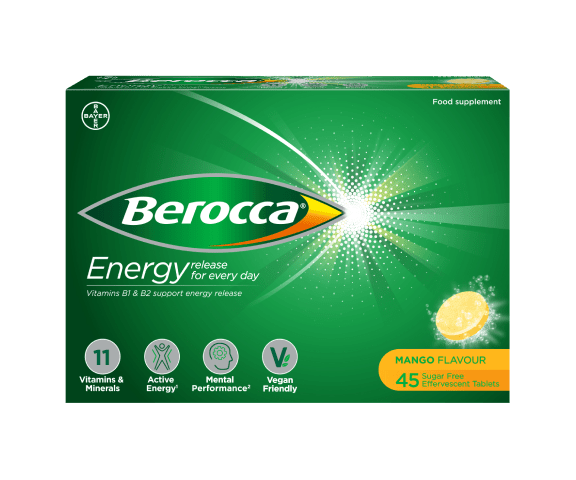Multivitamins: uses, benefits & how they work
When trying to support your overall health, there are a lot of different factors to consider and, as part of this, you may find yourself thinking about adding a multivitamin into your routine.
However, with so many different types available on the market, how can you tell which form of multivitamin is best suited to your needs?
In this guide, we take a detailed look at multivitamins, highlighting not only what they are and what they do but also answering several other key questions you might have about using them day-to-day.
What are multivitamins and what do they do?
Multivitamins are a form of food supplement that contain a combination of vitamins and minerals, and sometimes other ingredients.
Since there’s no set standard or regulatory definition of which nutrients they should include (or how much), multivitamins are often available in a range of doses and formulations, making it confusing to know which type to take.
However, they’re incredibly popular. In the UK alone, almost half (approximately 48%) of all adults use some form of multivitamin or dietary supplement at least once a week!
But that doesn’t mean multivitamins should be used as a substitute for a healthy diet. Eating plenty of fruits and vegetables and maintaining a healthy, balanced diet should be able to provide all the nutrients the body needs. Multivitamins are simply there to supplement any nutritional gaps, providing a little extra support to help you get all the necessary nutrients.
Do multivitamins work?
So now we know what multivitamins are and why they’re so popular, are they actually beneficial to our health?
With so many different multivitamin products available in various quantities across the market, it can be hard to compare them and determine which health benefits, if any, they can provide.
However, as set by the European Food Safety Authority, the individual vitamins and minerals that many multivitamins contain are associated with certain health benefits and claims (but more on these later on!).
For this reason, people tend to take multivitamins because they’re marketed for a range of different purposes. For example, this may include:
- Immunity: minerals like iron and vitamins like vitamin C and vitamin B9 (folate) contribute towards maintaining the normal function of the immune system
- Energy: vitamins like vitamin B6 support the body’s ability to convert food into energy for us to use (vitamin B6 contributes to normal energy-yielding metabolism)
- Aesthetic: vitamins like zinc help to maintain normal healthy hair, skin and nails
Which vitamins are included in multivitamins?
Most multivitamins contain a combination of vitamins (e.g. vitamins A, C, D, E and K, and the B vitamins) and minerals (e.g. calcium, iron and zinc).
Berocca® Mango Effervescent Tablets, for instance, contain 11 vitamins and minerals in just one tablet.11 This includes the B vitamins (B1, B2, B3, B5, B6, B7, B9 and B12), vitamin C, magnesium and zinc.
Meanwhile, Berocca® Immuno Effervescent Tablets also contain 11 vitamins and minerals in just one tablet. But the vitamins and minerals used are slightly different: B vitamins (B6, B9 and B12), vitamins A, C, D and E, and zinc, iron, copper and selenium.
In other words, different multivitamins contain different types and quantities of vitamins and minerals. That’s why it’s so important to follow the correct dosage instructions.
For further advice on which type of multivitamin is right for you, speak to your doctor or pharmacist.
What are the benefits of taking multivitamins?
Multivitamins support the proper intake of nutrients when you’re not managing to eat a balanced diet.
However, with so many choices on offer, it can be difficult to determine the benefits of different ingredients. So, we’re here to help you form your own opinion.
According to the European Food Safety Authority, for example, the vitamins and minerals that multivitamins contain are associated with their own set of unique health benefits.
While this list is not fully complete, here are some examples of the benefits that vitamins can have:
- Vitamin A: helps maintain healthy skin and normal eyesight and contributes to the normal functioning of the immune system
- Vitamin B1 (thiamine): helps support normal energy metabolism and the normal functioning of our heart and nervous system
- Vitamin B2 (riboflavin): helps reduce tiredness and fatigue and contributes to the normal function of the nervous system and maintenance of red blood cells
- Vitamin B3 (niacin): helps support normal energy metabolism and the nervous system, maintains healthy mucous membranes and skin, and helps reduce tiredness and fatigue
- Vitamin B5 (pantothenic acid): helps support mental performance and the production and metabolism of steroid hormones, vitamin D and some neurotransmitters (the body’s chemical messengers)
- Vitamin B6 (pyridoxine): aids normal energy metabolism, the production of an amino acid called cysteine and helps reduce tiredness and fatigue
- Vitamin B7 (biotin): helps maintain the normal functioning of the nervous system and healthy hair and skin
- Vitamin B9 (folate): helps support tissue growth during pregnancy, normal blood formation, helps the immune system and is important for maintaining normal cell division
- Vitamin B12: helps support normal energy metabolism, the production of red blood cells and keeps the immune system healthy
- Vitamin C: contributes to the normal function of the immune system, supports the normal function of the nervous system and helps with collagen production and the absorption of iron
- Vitamin D: helps support the body’s use of calcium and phosphorus, helps maintain normal blood calcium levels and helps with cell growth and division
- Vitamin E: functions as an antioxidant that helps protect DNA, protein and compounds called lipids from damage caused by oxidative stress
- Magnesium: helps support normal energy metabolism and electrolyte balance, contributes to normal nerve function, helps keep bones and teeth strong and contributes to protein synthesis
- Zinc: helps support DNA production, cognitive function and normal fertility and helps maintain normal bones, vision and the normal function of our immune system
- Iron: helps support normal cognitive function, contributes to normal energy metabolism and supports the production of red blood cells and haemoglobin (to carry oxygen around our body)
- Copper: helps maintain normal skin and hair pigmentation, contributes to normal energy-yielding metabolism and supports our connective tissues and immune system
- Selenium: helps support the maintenance of normal hair and nails, and supports the normal function of the immune system
Should you take multivitamins daily?
Most people should be able to get all the nutrients they need by maintaining a varied and balanced diet. This should involve:
- Eating at least five portions of a variety of fruits and vegetables every day
- Basing meals on high-fibre starchy foods like potatoes, bread, rice or pasta
- Using dairy or dairy alternatives (such as soya drinks)
- Consuming beans, pulses, fish, eggs, meat and other forms of protein
- Choosing unsaturated oils and spreads and eating them in small amounts
- Drinking at least six to eight glasses of water per day
However, some people struggle to get all the vitamins and minerals they need from their diet alone. So, if your busy lifestyle means that your diet isn’t well balanced, taking a multivitamin may help to supplement your nutritional needs.
People who avoid certain food groups (such as vegetarians or vegans), can't eat certain foods due to medical conditions (like allergies), may also be at a higher risk of nutrient deficiencies. So, taking a daily multivitamin may help to increase your intake.
Certain medical conditions and other risk factors, such as age, breastfeeding, bariatric surgery, long-term alcohol consumption or being pregnant, may also impact your ability to get enough of certain vitamins and minerals.
If you’re unsure about which multivitamin is the right choice for you to take, speak to your doctor or pharmacist.
Can you take too many multivitamins?
While multivitamins are generally considered to be well-tolerated, they can sometimes lead to various side effects – especially when taken in large doses. Some people may also be more sensitive to high doses of certain vitamins and minerals than others.
People on blood thinning medications (like warfarin) should also talk to their doctor before taking any multivitamin that contains vitamin K.
However, as long as you stay within the recommended nutritional limits, taking a multivitamin is unlikely to harm your health.
It’s important to remember that multivitamins should be treated as a supplement, not a substitute, for a healthy and balanced diet.
If you’re still not sure which type of multivitamin you need, speak to your doctor. They’ll be able to check your vitamin and mineral levels and provide you with personalised advice around your individual needs.
Find
The nearest shop
Get your Berocca from a store nearby.
*Berocca Boost contains caffeine which helps improve alertness and concentration. Do not exceed 400mg of caffeine per day. Not suitable for those pregnant or breastfeeding.





